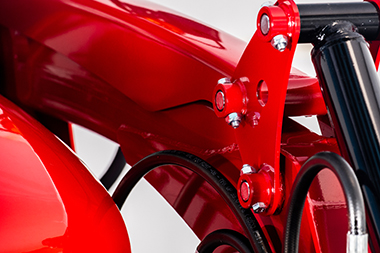
Choose the right grease for the job
Grease is composed of mineral or synthetic oil and a thickener and other additives. Mineral greases, also known as conventional greases, offer good value and are most commonly used in agricultural machinery. Synthetic greases, on the other hand, are pricier, but may give you an edge on performance, protection, and maintenance intervals. The choice between the two is not always black and white, and is highly contingent on operating conditions such as temperature, pressure, and load. You may discover that synthetic oils perform better in a range of different temperatures, while mineral greases are a solid choice for operating within a constant range of conditions.

Consult the operator’s manual for guidance
Once you select the proper grease for your tractor, you need to identify the points to lubricate. Refer to the operator's manual to grease all the right points. Your manual should provide a list, but as a general rule of thumb, if it rubs, turns, or oscillates against another surface, it needs lubrication. To find the operator’s manual for the entire TYM tractor lineup, visit the TYM Downloads page.
Schedule your maintenance
Maintenance frequency varies drastically based on working conditions, weather, and seasonality, but our maintenance schedule can help you plan out a working schedule. Here are some guidelines to keep your tractor running as smooth as possible.
- Grease every eight hours of operation. This is the standard recommendation for most tractors, but some lubrication points have different greasing intervals, so it's important to refer to the manual. Don’t skip greasing intervals, even if your tractor appears to be running fine. By the time you notice a problem, it may be too late to fix it.
- Remove old grease before applying new grease. Because some greases are made of different components and not always compatible with one another, any old grease should be completely removed before switching over to a new grease.
- Keep grease fittings clean. Before you re-grease, make sure to clean off the grease fittings in order to prevent dirt from getting into the bearing. Dirt can become caked on grease fittings and result in equipment failure.

Stay flexible and consult your local TYM dealer for support
The intricacies of operating a tractor can make its maintenance a time-consuming event at times. Even after you’ve identified grease points and developed a maintenance schedule, variables like weather conditions, duration of use, and exposure to chemicals can throw a wrench in your plans. In any case, remember that regular maintenance and adequate lubrication will ensure long-term efficiency in your tractor’s performance.
When choosing the right tractor grease and other lubricants for your tractor, be sure to do so in accordance with the manufacturer’s recommendations and local environmental regulations. For further support for your tractor and implements, consult your TYM dealer. To read about more ways to keep your tractor in top shape, read our guide to DIY maintenance.